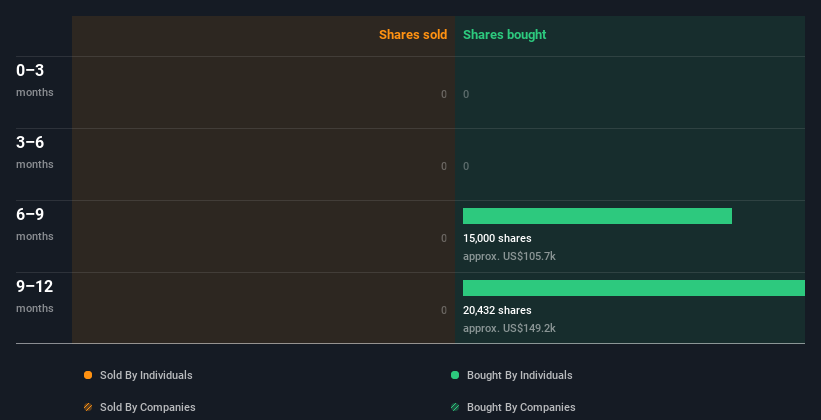Favourable Signals For eHealth: Numerous Insiders Acquired Stock
Usually, when one insider buys stock, it might not be a monumental event. But when multiple insiders are buying like they did in the case of eHealth, Inc. (NASDAQ:EHTH), that sends out a positive message to the company's shareholders.
Although we don't think shareholders should simply follow insider transactions, we do think it is perfectly logical to keep tabs on what insiders are doing.
Check out our latest analysis for eHealth
eHealth Insider Transactions Over The Last Year
In the last twelve months, the biggest single purchase by an insider was when Independent Chairman of the Board Dale Wolf bought US$106k worth of shares at a price of US$7.05 per share. That means that even when the share price was higher than US$5.20 (the recent price), an insider wanted to purchase shares. While their view may have changed since the purchase was made, this does at least suggest they have had confidence in the company's future. In our view, the price an insider pays for shares is very important. As a general rule, we feel more positive about a stock if insiders have bought shares at above current prices, because that suggests they viewed the stock as good value, even at a higher price.
eHealth insiders may have bought shares in the last year, but they didn't sell any. You can see a visual depiction of insider transactions (by companies and individuals) over the last 12 months, below. If you click on the chart, you can see all the individual transactions, including the share price, individual, and the date!
There are always plenty of stocks that insiders are buying. So if that suits your style you could check each stock one by one or you could take a look at this free list of companies. (Hint: insiders have been buying them).
Does eHealth Boast High Insider Ownership?
Many investors like to check how much of a company is owned by insiders. Usually, the higher the insider ownership, the more likely it is that insiders will be incentivised to build the company for the long term. Our data indicates that eHealth insiders own about US$6.1m worth of shares (which is 3.9% of the company). Whilst better than nothing, we're not overly impressed by these holdings.
So What Does This Data Suggest About eHealth Insiders?
The fact that there have been no eHealth insider transactions recently certainly doesn't bother us. But insiders have shown more of an appetite for the stock, over the last year. The transactions are fine but it'd be more encouraging if eHealth insiders bought more shares in the company. While we like knowing what's going on with the insider's ownership and transactions, we make sure to also consider what risks are facing a stock before making any investment decision. For example - eHealth has 3 warning signs we think you should be aware of.
But note: eHealth may not be the best stock to buy. So take a peek at this free list of interesting companies with high ROE and low debt.
For the purposes of this article, insiders are those individuals who report their transactions to the relevant regulatory body. We currently account for open market transactions and private dispositions of direct interests only, but not derivative transactions or indirect interests.
Have feedback on this article? Concerned about the content? Get in touch with us directly. Alternatively, email editorial-team (at) simplywallst.com.
This article by Simply Wall St is general in nature. We provide commentary based on historical data and analyst forecasts only using an unbiased methodology and our articles are not intended to be financial advice. It does not constitute a recommendation to buy or sell any stock, and does not take account of your objectives, or your financial situation. We aim to bring you long-term focused analysis driven by fundamental data. Note that our analysis may not factor in the latest price-sensitive company announcements or qualitative material. Simply Wall St has no position in any stocks mentioned.

 Yahoo Finance
Yahoo Finance 
